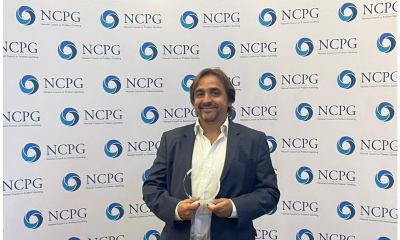Compliance Updates
NJ Attorney General Platkin Announces the Retirement of Division of Gaming Enforcement Director David Rebuck

Attorney General Matthew J. Platkin announced the retirement of David L. Rebuck after serving 13 years as the Director of the Division of Gaming Enforcement (DGE), making him the longest-serving director in DGE’s history. In total, Director Rebuck is retiring with 36 years of service to the State.
Attorney General Matthew J. Platkin said: “Throughout his career, David Rebuck has exemplified professionalism, innovation, and leadership as the gaming industry transformed, first with the legalization of Internet gaming in 2013 and then with the new era of sports gaming in 2018. His extensive knowledge of the gaming and casino industry has made New Jersey a recognized regulatory leader and pacesetter in the United States. With Dave’s departure, however, I am pleased to announce that Deputy Director Mary Jo Flaherty will assume the role of Interim Director. Mary Jo is a respected and talented lawyer, and brings with her over 40 years of experience of regulating the gaming industry within DGE. I am grateful for her stepping up to lead the Division at this critical time.”
Director Rebuck said: “I have always said the achievements at DGE have not been the result of any one person. I have been privileged and grateful to work with an amazing team at DGE and to serve under two governors and eight attorneys general.”
Rebuck’s career with the Department began as a Deputy Attorney General in January 1988. He provided legal advice in the review of programs and operations within LPS, assisted in the evaluation of the performance of agencies within the Department, and reviewed legislation.
In February 2010, he was assigned to the Governor’s Office as a Senior Policy Advisor. While at the Governor’s Office, Director Rebuck assisted in the Governor’s initiative to reinvigorate Atlantic City and was a member of the “Red Tape Review Group”. Director Rebuck was nominated by Governor Chris Christie to lead DGE on April 29, 2011, and assumed the role of Acting Director on that date. Rebuck was confirmed by the State Senate and sworn in as DGE Director on January 24, 2012.
Rebuck’s tenure at DGE began shortly after P.L. 2011, c. 19 which effectuated the most significant overhaul the Casino Control Act had experienced in its history as of that date. The legislation brought with it sweeping changes, including the assignment to DGE of many responsibilities previously performed by the Casino Control Commission. Under Director Rebuck’s leadership, DGE re-examined the entire set of existing casino regulations to ensure consistency and efficiency. A complete new set of regulations was adopted in December 2011.
Director Rebuck led DGE through additional innovative changes to the gambling industry in New Jersey; in 2013, the State became the first in the country to launch legalized Internet casino gambling, and in 2018, after a protracted legal battle led by New Jersey, commenced legal sports wagering. In addition to overseeing the launch of new forms of gaming, Director Rebuck oversaw the launch of DGE’s Responsible Gambling Initiative last year and implemented enhanced advertising standards for New Jersey’s casino and sports betting industry. He also spearheaded new initiatives to improve casino security and safety in the Tourism District in Atlantic City.
To mark his contributions at DGE, Director Rebuck will be honored with a Lifetime Achievement Award at the 27th Annual East Coast Gaming Congress (ECGC), becoming only the fifth person in ECGC’s history to receive such recognition. The award will be presented on April 18, 2024 at the Hard Rock Hotel & Casino in Atlantic City.
DGE Deputy Director Flaherty’s service as Interim Director is effective Friday, March 1, 2024. Flaherty began her career with DGE in 1979 and holds a J.D. from the Seton Hall Law School. As Deputy Director, she is responsible for overseeing casino licensing, financial analysis and reporting, employee licensing, public records requests, equal employment opportunity within the industry and DGE, ethics compliance, and the release of information to law enforcement agencies and gaming authorities.
Compliance Updates
IGSA Welcomes Sharp Vision as Silver Member

The International Gaming Standards Association (IGSA) has welcomed Sharp Vision as a new Silver member. Sharp Vision is a leading provider of regulatory turnkey solutions for gaming authorities.
“We are delighted to be a part of IGSA and we look forward to contributing to the advancement of best practices among regulators in the fast-growing gaming industry,” Damien Raymond, COO of Sharp Vision, said.
“IGSA is very excited to welcome Sharp Vision to our membership. We believe that IGSA Standards can enhance Sharp Vision’s products supporting regulatory authority oversight. We look forward to their participation in IGSA committees,” Mark Pace, President of IGSA, said.
Compliance Updates
PGCB Places Seven Individuals on Involuntary Interactive Exclusion List for Online Gaming Fraud

The Pennsylvania Gaming Control Board (PGCB) on Wednesday approved recommendations by its Office of Enforcement Counsel (OEC) for the placement of seven individuals on the iGaming Involuntary Exclusion List.
The online transactions that these seven individuals engaged in, totaling $27,168, were investigated by the Board’s Bureau of Investigations and Enforcement (BIE) and found to be fraudulent in two major respects:
- an individual used a fraudulent scheme to obtain an online account or accounts in another person’s name and identifiers, placed funds into these accounts utilizing other persons’ payment methods, and without engaging in any gaming activity, managed to have funds withdrawn from the fraudulently-established account or accounts directly into their own bank account; or,
- requested and received a refund for a disputed credit or debit card transaction from a card issuer even though that refund was fraudulent.
The specific fraudulent conduct of each individual is further described below:
- Created two separate online sports wagering accounts using the personal identification and credit cards of other individuals, and withdrew $300;
- Created 13 separate online casino-type games accounts using the personal identification and credit cards of other individuals, and withdrew $545;
- Created six separate online sports wagering accounts using the personal identification and credit cards of other individuals, and withdrew $1000;
- Created four separate online sports wagering accounts using the personal identification and credit cards of other individuals, and withdrew $1123;
- Created two separate online sports wagering accounts using the personal identification and credit cards of other individuals, and withdrew $1500;
- Illegally requested and received six chargebacks to a credit card associated with an online casino-type games account totaling $10,100;
- Created one online sports wagering account using the personal identification and credit card of another individual, and withdrew $12,600.
The Board’s actions in these matters stem from its commitment to keep individuals who have committed fraud from gaming online in Pennsylvania. The additions made bring to 37 the total number of individuals who are currently on the iGaming Involuntary Exclusion List.
The Board also placed four other individuals on its Casino Involuntary Exclusion List. The number of individuals currently on that list totals 1197 and stems from various reasons including theft, cheating, child endangerment disorderly conduct, and using counterfeit currency.
Compliance Updates
PandaScore secures their first US betting license, by entering Colorado

After a meticulous and measured research process in consultation with the needs of its clients, PandaScore has acquired a license to operate in the US state of Colorado.
Through the license, PandaScore has signalled its intentions in the US market: forging a supplier-led path to esports betting success in the US. Existing PandaScore clients can now enter the Colorado market, scale up their esports offering and build their future audience in the state’s esports-friendly regulatory framework.
Future clients can also be confident that working with PandaScore supports their growth strategy in the lucrative US market. The state’s esports-friendly regulatory framework serves as a solid foundation to cultivate an esports audience and take advantage of PandaScore’s innovative, revenue-driving products such as BetBuilder, player props and microbetting.
PandaScore selected Colorado as its first point of entry into US licensing thanks to the state’s large catalogue of esports titles and competitions that are eligible for regular betting, and the wide range of markets that can be offered. Additionally, the state’s flexible and innovation-friendly licensing regime makes it a strong market for PandaScore and its clients.
Securing the license also serves as proof of concept for the French esports supplier, PandaScore Legal Counsel Alexis Brunet noted that “securing the Colorado license is a strong signal of our intentions in the US and are serious about its potential. Esports in the United States is a fast-evolving regulatory environment, but it’s only going in one direction: expansion. We intend to provide our best-in-class products and services to our customers no matter where they are, and service one of the largest markets in the world.”
For PandaScore CEO Flavien Guillocheau, entry into Colorado in the US market was the natural next step in the company’s client-first, service-oriented approach: “For esports to succeed in the US, suppliers must lead from the front. Suppliers need to address the uncertainty around regulation which has held back operator investment and thus growth of the vertical.
“We’ve proven we know the market, get a license efficiently and do it in a way that puts operators first. We’re confident that if our clients are seeking entry into a given market, we can be completely straight with them, show them the viable pathway to success, and create the foundation and access they need to fully harness the potential of esports in one of its biggest consumer markets.”
-

 Latest News3 days ago
Latest News3 days agoFast Track Secures Landmark Deal with Suprema Group – Setting a New Standard in the Brazilian iGaming Market
-

 Gambling in the USA5 days ago
Gambling in the USA5 days agoBetBlocker Recognised for Outstanding Contribution to the Prevention of Gambling Harm at NCPG Awards 2024
-

 Latest News3 days ago
Latest News3 days agoLight & Wonder Expands Presence in Oregon with Additional Placements of KASCADA Dual Screen Multi-Games
-

 Industry News4 days ago
Industry News4 days agoPenn Entertainment to Lay Off About 100 Employees
-

 Latest News3 days ago
Latest News3 days agoRakin’ Bacon Sahara® Launches Exclusively in New Jersey at Hard Rock Hotel & Casino Atlantic City and online at Hard Rock Bet
-

 partnerships3 days ago
partnerships3 days agoGGPoker & Triton Poker Offer High-Roller And Super-High-Roller Events At 2024 WSOP Paradise
-

 Latest News3 days ago
Latest News3 days agobet365 Announces Official Launch in Pennsylvania
-

 Daily Fantasy Sports5 days ago
Daily Fantasy Sports5 days agoDraftKings Becomes Official Partner of the WNBA







